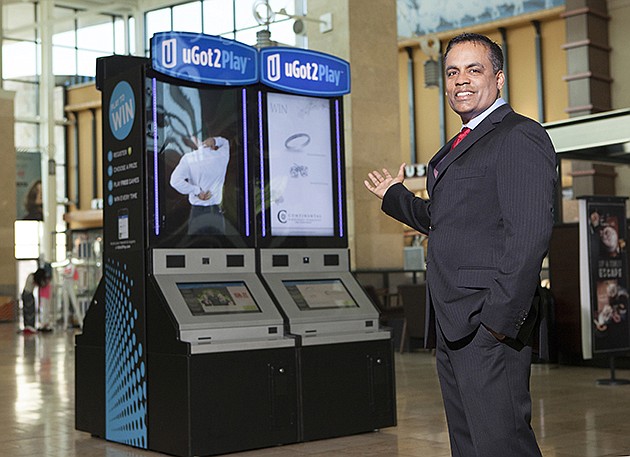- November 24, 2024
-
-
Loading

Loading

There were many long nights for Milind Bharvirkar driving in a van from city to city across the country to promote his business idea.
The only thing that kept him company was a prototype gaming machine in the back, a kiosk reminiscent of video arcade machines of the 1980s. Only this machine had a 21st century touch. And that's what he hopes will change the way businesses connect with customers.
Bharvirkar, founder of Priatek LLC in Odessa, describes the machine, what he calls a UGot2Play kiosk, as prize-based digital advertising. His machine looks a lot like the digital advertising billboards a shopper might find next to the store map at a mall. A touch screen just below the device, however, gives that shopper a chance to learn more about the advertiser. That includes earning rewards of prizes that range from discount coupons to hot-air balloon rides to even the chance to drive a Ferrari for a weekend.
“If you're going to engage people, it has to be fun,” says Bharvirkar, who founded Priatek four years ago. “You can spend $4,000 to $15,000 a month to advertise on an indoor billboard in a mall, or you can try to be interactive, and make it worthwhile for someone.”
The firm has had some early victories. Angel investors, for example, have provided $3 million for research and development of the UGot2Play kiosk, Bharvirkar says. His business model is to sell franchise territories around the country for $50,000 per million in population, setting up the leased machines in high-traffic pedestrian areas.
The digital displays will feature advertisers both at the national and local level. Priatek will sell the service to advertisers, who provide the prizes, and also pay every time someone walks up to the kiosk and selects their company to learn more. It's similar to the Google AdSense model, where advertisers set a budget and then pay only for every qualified click.
Priatek will earn money through franchise fees and a portion of advertising revenue. That advertising revenue is shared with the franchisee, as well as the store or mall housing a particular kiosk.
“After someone comes up and registers or logs in, they pick a product to play for,” Bharvirkar says. “When they're done, they'll get issued a random coupon from the advertiser, but they could also get more. They never know what they're going to win.”
It's no accident the kiosks resemble arcade games. Bharvirkar first made a name for himself in the business world as one of the founders of Global VR, a video arcade manufacturer in San Jose, Calif. The company developed the cabinet — the physical shell of the arcade game — and licensed existing video games like EA Sports PGA Tour to fill it.
But when digital devices became more popular for mobile game playing, demand for arcade games shrunk. Bharvirkar left Global VR in 2005. He stuck with games, even signing a deal at one point with the massive comic book and film entertainment company Marvel, only to fall short on the technology development side.
Bharvirkar decided to focus on what he knows, only to adjust his thinking to where consumers are today.
“Sometimes you just have to step back before you take that step forward,” Bharvirkar says. “You really have to think about what's missing, what people would be willing to pay for if they had a chance.”
Follow Michael Hinman on Twitter @BizTampaBay